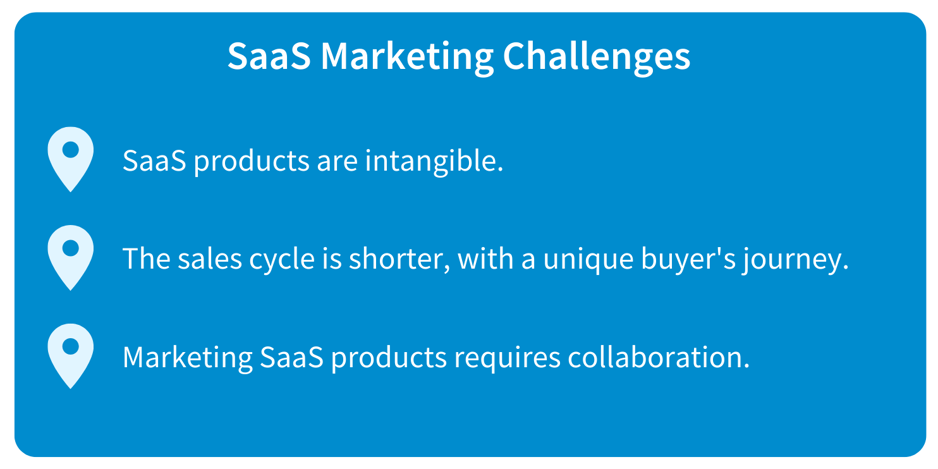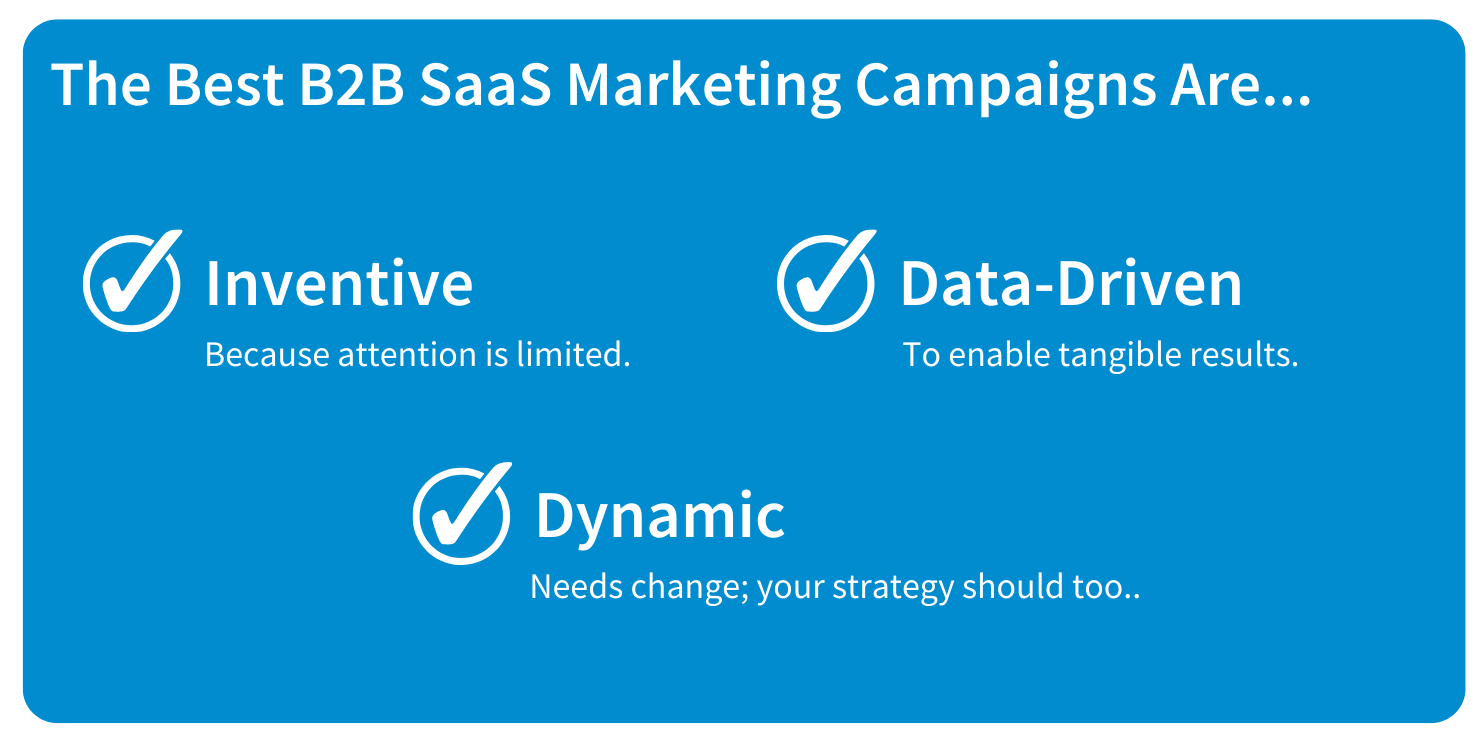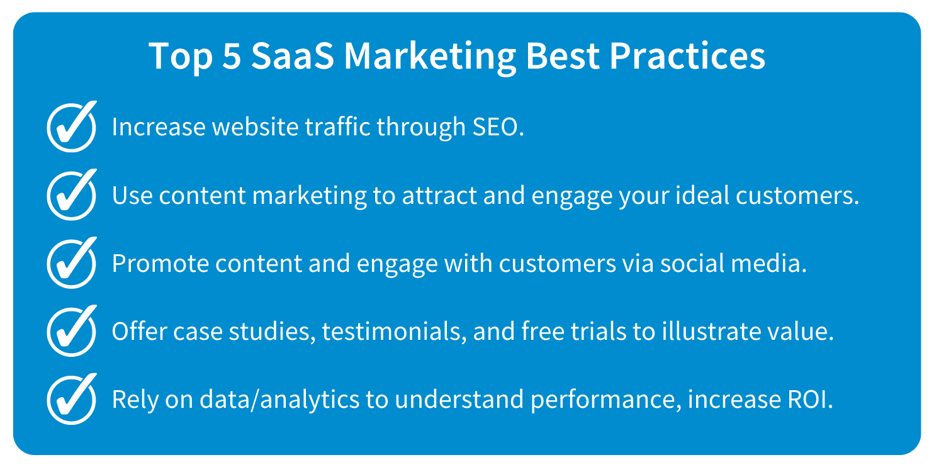What Are SaaS Best Practices?
November 30, 2022 •Josh Daugherty

Over the past 20-plus years, the explosive growth of the software-as-a-service (SaaS) industry has posed a unique challenge. How do you market a product that lacks a physical, tangible presence? How do you attract potential customers, and show them you understand their priorities and pain points? And how do you make them understand why your offering is the best solution for their needs?
Especially for those who might be new to the world of SaaS marketing, it can feel intimidating to design your first campaign. We get it—that’s why we’ve put together this blog with some SaaS marketing best practices so you can hit the ground running, with solid earth beneath your feet.
What Are the Characteristics of SaaS Marketing That Make It Particularly Challenging?
There are a few challenges to be aware of when considering how to market a SaaS product, including:
- The Unique Nature of SaaS Products: No matter how many features and benefits you can articulate, the truth is that SaaS solutions are intangible. And they can be really complex, especially for non-experts. This means marketers have to pay special attention to educating prospects about their product/service offerings, how they work, and how they can benefit the buyer.
- The Sales Cycle and Buyer’s Journey: When you’re marketing or selling SaaS products, the sales cycle tends to be rather short. At the same time, SaaS marketers have to understand their prospects’ buying process and tailor their marketing to each of the different stages, helping guide customers through the process of awareness, consideration, and decision/purchase.
- Collaboration is Required: Whether you want to call it alignment, synergy, or plain-old collaboration, it’s a must-have component of any SaaS marketing strategy. While marketers might lead the charge, they need to work closely with other teams or departments, including product, technology, sales, and more. At different stages through the buyer’s journey, there are unique opportunities to increase customer understanding, provide timely value propositions, and guide the prospect through their purchase.

What Makes the Best B2B SaaS Marketing Campaigns Succeed?
There are three hallmarks of a successful B2B SaaS marketing strategy:
- They’re Inventive: We live in a world where our attention is one of our most valuable commodities. This means SaaS marketers must be creative above virtually everything else. They have to be storytellers, able to describe complex features and connect them with tangible, customer-focused benefits. Most SaaS companies have direct competitors, meaning they need to develop a voice and approach that will set them apart when features and benefits don’t offer vast differentiation.
- They’re Data-Driven: Since a budget tends to be finite, SaaS marketers need to get as much ROI as possible from every campaign they run. To do this, they need to base their strategies around tangible, measurable goals and a deep understanding of their ideal customers (including their priorities, pain points, and decision-making processes).
- They Are Dynamic: While there can be dangers to being over-reactive to slight dips in metrics, it’s still vital to monitor how their efforts are performing, so they can adjust their strategies accordingly. This level of insight also empowers them to design even better campaigns moving forward, based on the results.

Our Top 5 SaaS Marketing Best Practices
Apply these best practices to develop a winning B2B SaaS marketing strategy.
1. Increase Website Traffic Through Search Engine Optimization (SEO).
Many SaaS marketers find it difficult to attract organic traffic to their website, which is unfortunate because SEO works. By leveraging SEO strategies, organizations can attract and engage prospects, guide them through the buying journey, and develop positive customer relationships.
Basic SEO best practices include optimizing your website content so that when potential customers are looking for solutions to a challenge they’re experiencing, they’ll organically arrive at your website. This closely relates to the second best practice on our list—content marketing.
2. Use Content Marketing to Attract and Engage Your Ideal Customers.
Like general SEO practices, content marketing is an effective way to increase your website traffic and improve the quality of your leads. At the heart of content marketing is a simple enough notion: produce and publish informative, engaging content that will, in itself, provide compelling value to your audience. This helps you establish your company as an industry leader or authority, which can be the difference between winning their business and just being another SaaS company with a product to sell.
For the best results, we recommend doing keyword research to determine the types of questions your ideal customer is asking, so you can tailor specific content to their needs. This helps build trust and credibility, which is especially important since customers prefer to do business with companies that seem to understand them and care about their problems. DemandJump’s keyword research and content planning tools were developed to empower SaaS marketers with the data they need to craft an effective campaign.
3. Promote Your Content and Engage with Customers via Social Media.
Website content is one thing—but for modern SaaS marketers, social media is where the real conversations are happening. Your social media presence doesn’t have to be overly complex or extensive. It just needs to be honest, catchy, and clever. It can be a delicate balance, but effective social media marketing helps increase brand awareness while developing a company voice or persona that prospects can relate to. You can use social media to engage with your audience however you see fit and promote any new content you’re publishing.
4. Offer Case Studies, Testimonials, and Free Trials To Illustrate Value.
Since SaaS products are intangible, it can be difficult to demonstrate their value to customers. This is especially true if the basic features and benefits of your solution aren’t substantially different from what your competitors offer. That’s why so many SaaS companies offer “proof” in the form of case studies or testimonials, product demos, or free trial offerings.
Curious about DemandJump? Once you finish reading this post, click on the big orange “Try It Free” button at the bottom of the page to see exactly what DemandJump is all about!
5. Rely on Data & Analytics To Understand Performance and Improve ROI.
Tracking the performance of a SaaS marketing campaign can greatly impact its ROI, especially when timely adjustments can be made to shore up underperforming elements or further develop strategy components that are working well. Without keeping a close watch on key metrics and performance indicators, SaaS marketers risk wasting their investment(s) on hunches or instincts that may or may not have a positive impact.

Develop a Better B2B SaaS Marketing Strategy Today—With DemandJump
If you’re ready for a new approach to SaaS marketing—one that’s in line with the SaaS best practices outlined in this article—then DemandJump might just be the perfect solution. We offer an AI-powered platform that can empower you to better understand your ideal customers, including their priorities and pain points. With our AI-powered keyword research tools, you can know exactly what kinds of content to create and promote within your marketing strategy.
Better insights—and better results—are waiting. Go ahead and click the button below to test out the platform, or listen to an episode or two of our Page One or Bust podcast to gain more insights directly from some of the best minds in the industry.
Featured Articles
Categories
- Attribution Tracking (13)
- Channel Optimization (11)
- Consumer Insights (68)
- Content Marketing (251)
- Data Science (8)
- Digital Marketing (6)
- Digital Transformation (26)
- Enterprise (10)
- Lead Generation (14)
- Market Intelligence (8)
- Marketing Analytics (39)
- Marketing Attribution (57)
- Marketing Management (153)
- Marketing Operations (86)
- Organic Search (222)
- Paid Search (52)
- Pillar-Based Marketing (63)
- Programmatic Advertising (9)
- SaaS Content (14)
- SaaS Marketing (29)
- Search Marketing (111)
- SEO Keyword Research (28)
- SEO Pillar (18)
- SEO Strategy (46)
- SMB (5)
- Website Content (12)


